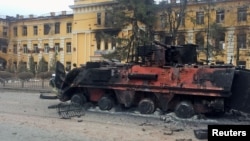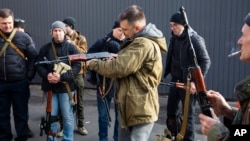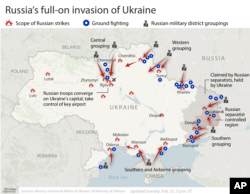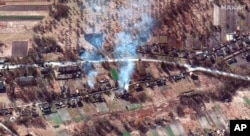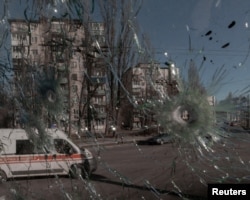Moscow and Kyiv will hold a second round of peace talks, according to both governments, after Ukrainian delegates demanded an immediate cease-fire and withdrawal of Russian forces during initial talks Monday on the border with Belarus.
The peace talks lasted five hours, and no cease-fire was reached. At the start of the talks, Ukraine's Interior Ministry said dozens of civilians had been killed and hundreds wounded from Russian shelling in Kharkiv, near the border with Russia.
U.S. officials expressed skepticism over Russia's intentions during the peace talks.
"Diplomacy at the barrel of a gun, diplomacy at the turret of a tank — that is not real diplomacy. We are ready and willing, just as our Ukrainian partners are, just as our European allies are, to engage in real, in substantive, in genuine diplomacy in order to see if we can find a way out of what is a needless, brutal conflict," State Department spokesperson Ned Price told reporters Monday.
On the other hand, Russian negotiator Vladimir Medinsky said Monday that Russia's goal was to come to an agreement that was in the interest of both sides.
Ukrainian resistance, coupled with the Russian military's logistical failures, has slowed Moscow's invasion into Ukraine. After five days of fighting, Russia's military has not taken a single major Ukrainian city, with its "main push" toward Kyiv about 25 kilometers outside the city center after advancing only a handful of kilometers Sunday, according to a senior U.S. defense official.
"You've got to hand it to the Ukrainians, who have been fighting very hard for their country and making an impact and making a dent on Mr. Putin's abilities," Pentagon press secretary John Kirby told reporters Monday. "But they will learn. The Russians will learn from this," he added.
In a YouTube video, a Russian Defense Ministry spokesperson said that troops in Lugansk with Russian Federation backing have advanced 23 kilometers, taking control of the Novaya Astrakhan and Borovenki villages. He also said the Donetsk forces blocked Maruipol.
"All settlements that have come under the control of the Armed Forces of the Russian Federation continue to live as usual. The life support facilities of the population are functioning, transport is working," the spokesperson said.
A Russian convoy of hundreds of armored vehicles, tanks and logistics support vehicles was seen moving toward Kyiv from the north, according to satellite imagery from Maxar Monday.
Russian President Vladimir Putin has now committed to the invasion nearly 75% of the combat power Russia pre-positioned around Ukraine's borders. But videos posted on social media show that lines of Russian tanks and armored vehicles have been wiped out. Warplanes and helicopters have been shot down, according to officials, and Russian troops have been stranded on roadsides after their vehicles ran out of fuel.
"Airspace over Ukraine remains contested. Russians have not achieved air superiority over the whole country. Ukrainian air defenses remain intact and viable, both in terms of aircraft and missile defense systems," a senior U.S. defense official told reporters Monday.
The official added that it appeared Russian forces were trying to section off the eastern part of Ukraine by controlling land from Kharkiv to Mariupol in the south. Neither city had been broken by Russian advances, although Kharkiv has seen the "heaviest fighting," according to officials.
Ukrainian President Volodymyr Zelenskyy urged the West on Friday to consider a Russian aircraft no-fly zone over Ukraine.
"Fair negotiations can occur when one side does not hit the other side with rocket artillery at the very moment of negotiations," Zelenskyy said.
In response to a question from Voice of America, the Pentagon said the United States was not considering such a measure.
Ukraine seeks EU admittance
Also Monday, Zelenskyy urged the European Union to grant his country immediate membership in the bloc.
Zelenskyy signed an application Monday for Ukraine to join the EU, asking for a fast-track accession in a video message in which he also encouraged Russian troops to lay down their arms.
"Our goal is to be together with all Europeans, and most importantly, to be on an equal footing," he said. "I'm sure it's fair. I'm sure it's possible."
NATO Secretary-General Jens Stoltenberg said he had spoken with the Ukrainian leader by phone and "commended him for the bravery of the people and armed forces of Ukraine."
"NATO allies are stepping up support with air-defense missiles, anti-tank weapons, as well as humanitarian and financial aid," Stoltenberg tweeted.
Russia faced increased diplomatic and economic pressure Monday, the fifth day of its invasion, with Russia's currency plunging to a record low and the addition of new sanctions against the country's central bank.
Switzerland on Monday announced it would forego its commitment to "Swiss neutrality" in favor of adopting sanctions against Russia. Swiss Confederation President Ignazio Cassis said that Switzerland's sanctions would be in line with those already adopted by the European Union.
The European Union imposed sanctions on 26 more Russians Monday, bringing the total of people targeted in the country to 680.
Russia announced Monday that it had closed it airspace to flights from 36 nations, including European countries, following a decision by the EU and other nations over the weekend to close their skies to Russian aircraft.
U.S. President Joe Biden spoke via conference call with several allies Monday on their continued support to Ukraine and their coordinated efforts to impose severe costs and consequences to hold Russia accountable.
A day after the EU said it was sending fighter jets to Ukraine, Australia on Monday committed to an unspecified delivery of lethal military equipment.
Asked by VOA how the U.S. was helping to get international military aid to Ukrainians, the senior defense official told reporters, "I don't know of a single unified sort of body to pull that together. Right now, countries are doing what they can, when they can and where they can, and that includes the United States."
Russian reaction
Kremlin spokesman Dmitry Peskov told reporters Monday that the EU was engaging in hostile behavior toward Russia and that providing arms to Ukraine was an "extremely dangerous and destabilizing factor."
Peskov also said that while sanctions imposed against Moscow were heavy, Russia had been planning for them and "has the potential to offset the harm."
At least 350 civilians have been killed since Russia invaded last week, with 1,700 wounded, Ukraine said Sunday. There was no information about casualties among Ukrainian forces, and while Russia has acknowledged casualties among its troops, it has not publicly disclosed any count.
"This is a war of choice, completely and totally unavoidable, and all the casualties are on his hands, all the blood is on Mr. Putin's hands," Kirby said Monday.
More than 500,000 refugees have fled Ukraine for neighboring countries, according to U.N. High Commissioner for Refugees Filippo Grandi.
Putin told his defense minister to put nuclear forces in a "special regime of combat duty" Sunday, saying that leading NATO powers had made "aggressive statements" and imposed financial sanctions over its invasion of Ukraine.
Following a vote for a rare special session of the U.N. General Assembly, U.S. Ambassador Linda Thomas-Greenfield responded to Putin's nuclear alert, saying Russia "is under no threat from NATO, a defensive alliance that will not fight in Ukraine. This is another escalatory and unnecessary step that threatens us all. We urge Russia to tone down its dangerous rhetoric regarding nuclear weapons."
"We think provocative rhetoric like this regarding nuclear weapons is dangerous, adds to the risk of miscalculation, should be avoided, and we will not indulge in it," White House press secretary Jen Psaki added on Monday.
VOA's Jamie Dettmer, Heather Murdock, Anita Powell and Nike Ching contributed to this report. Some information for this report came from The Associated Press, Agence France-Presse and Reuters.




